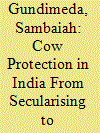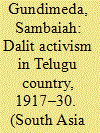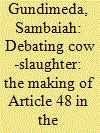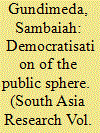|
|
|
Sort Order |
|
|
|
Items / Page
|
|
|
|
|
|
|
| Srl | Item |
| 1 |
ID:
159755


|
|
|
|
|
| Summary/Abstract |
Cow protection, a potent tool in the hands of cow vigilantes for atrocities against Muslims and Dalits, has become a heavily politicised issue in contemporary India. Its roots, connecting the themes of caste-Hindu religious sentiment, communalism and economic reasoning, can be traced to the late nineteenth century, though basic problems over the intriguingly complex use of cattle are clearly much older. This article relates contemporary cow protection debates specifically to Arya Samaj arguments against cow slaughter in the late nineteenth century and publication of a special issue of the journal Kalyan, titled Gau Ank, in 1945. The discussion shows how cow protection debates in the Constituent Assembly of India and in subsequent post-independence judicial verdicts were heavily influenced by these two earlier discourses. Analysing two landmark judicial decisions on cow slaughter, the article argues further that recent judicial endorsement of cow protection legitimises Hindu majoritarian sentiments in the law, while depriving millions of Indians, not just Muslims, of fundamental rights to food and livelihood. The conclusion attempts to consider some possible solutions to the current impasse.
|
|
|
|
|
|
|
|
|
|
|
|
|
|
|
|
| 2 |
ID:
148512


|
|
|
|
|
| Summary/Abstract |
This article argues that the politics of lower castes and their struggles for social equality and political representation cannot be effectively subsumed under a homogenous non-Brahmin category. Contesting the argument that the mobilisation of the lower castes/non-Brahmins in southern India was organised around the ideology of Dravidianism, this research examines what is today called Dalit activism in the Telugu country, related to the ideology of Adi-Dravida/Adi-Hindu. It also identifies discrimination of Dalits as well as between Dalits, in times before Gandhi and Ambedkar appeared on the scene.
|
|
|
|
|
|
|
|
|
|
|
|
|
|
|
|
| 3 |
ID:
189431


|
|
|
|
|
| Summary/Abstract |
The present article examines the efforts of the Hindu conservatives at securing support for a law to ban cow-slaughter during the intervening years of India’s Independence. It also critically examines the debate on this question in the Constituent Assembly of India. Through this examination the article notes how the Hindu conservatives prepared the ground for a law against cow-slaughter even prior to the question being debated in the Constituent Assembly. Further, it argues that by an exclusive consideration of the views of the practitioners of conservative Hindu religion, whose ideology is based on a monolithic conception of Hinduism, over cow and conversely disregarding the others’ views, particularly of Islam on the same, the makers of the Constitution of India sought to impose a Hindu religious practice upon the non-believers of Hindu religion. The article also highlights the role of Ambedkar in the making of Article 48. The article is divided into three sections, wherein the first section looks at the Hindu conservatives’ attempts at securing support for a law against cow slaughter, the second and third sections analyze the debate over the question of cow-slaughter in the Constituent Assembly of India.
|
|
|
|
|
|
|
|
|
|
|
|
|
|
|
|
| 4 |
ID:
091724


|
|
|
|
|
| Publication |
2009.
|
| Summary/Abstract |
Equality of treatment for all citizens and their cultures in public places is one of the prominent declarations of the secular Constitution of India. The hegemony of Hindu culture in the public sphere, however, reflects a dichotomy between stated declarations and social reality. Placing Dalits at the bottom of the caste hierarchy, if not outside it, 'mainstream' Hindu culture not only marginalised but importantly rejected the Dalits and their culture. This article examines the saga of the demand for a beef stall by the Dalit students in Hyderabad Central University and argues that the rejection of the culture of any community injures the human agency of that community. It is proposed that such injury can be healed only by a dialogical process, involving assertion of positivity and pride in the culture of the injured and positive recognition of such assertion by the injurer. Democratisation of the public sphere can be actualised by according representation to marginalised cultures, but in addition such representation needs to be accompanied with respect.
|
|
|
|
|
|
|
|
|
|
|
|
|
|
|
|
|
|
|
|
|